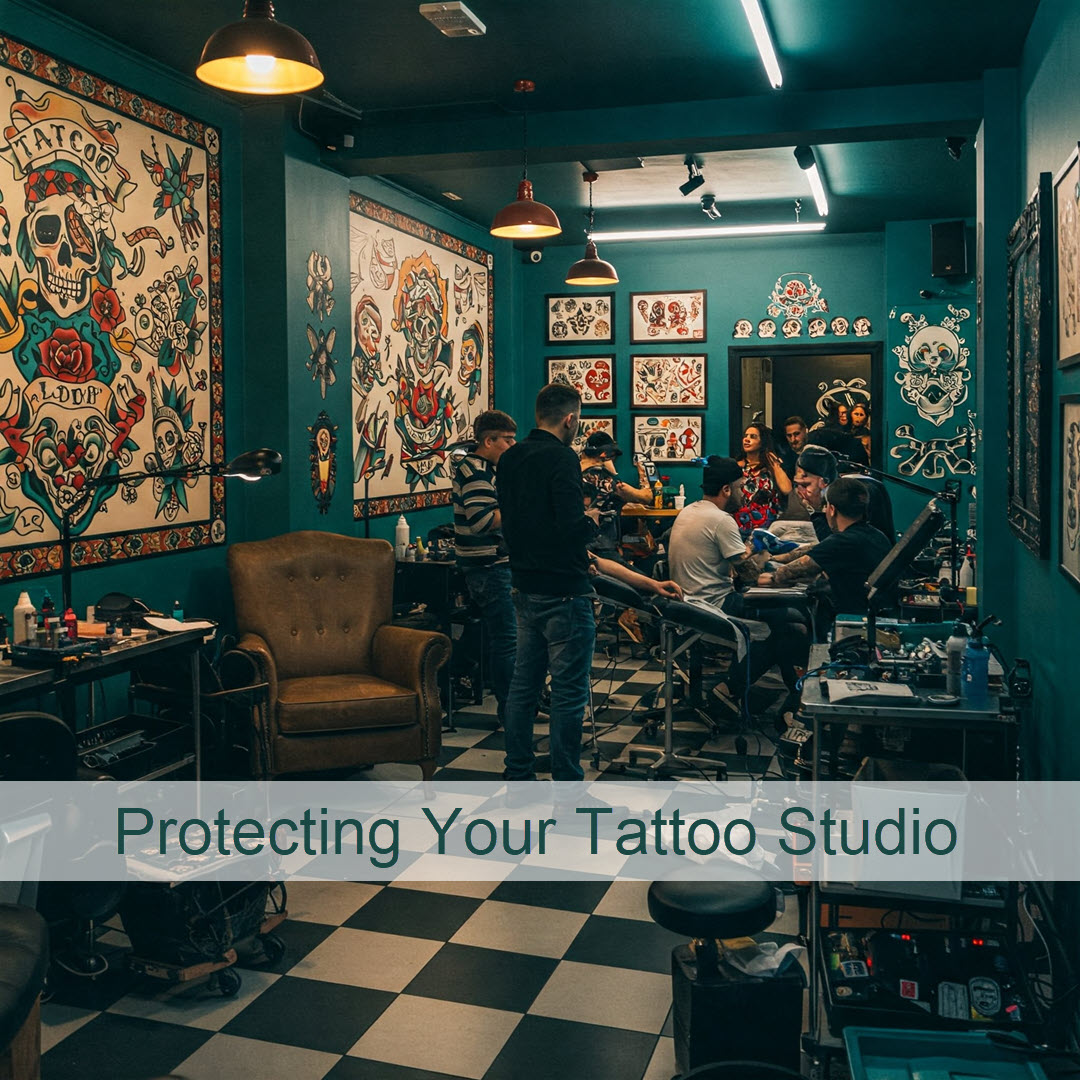Discover Ways to Safeguard Your Studio from Expensive Legal Cases & Unforeseen Catastrophes

Protect Your Studio Like a Pro: Tips for Smart Artists
Discover Ways to Safeguard Your Studio from Expensive Legal Cases & Unforeseen Catastrophes
Tattooing goes beyond mere expression of art—it is also a means of earning a living. As the tattoo culture continues to flourish, tattoo shop owners face not only creative obstacles but also legal liabilities, potential property damage, and client disagreements, all of which can jeopardize the success of their studio.
Any business may have these issues, but you want to safeguard your business as an artist owning a tattoo studio.
A single lawsuit or unforeseen disaster could destroy all the hard work and effort you have put into building your business. This is why having appropriate insurance coverage is not just a wise decision but a necessity.
Unforeseen Dangers You May Face
Numerous tattoo parlor owners believe that their general liability insurance is adequate. However, regular business insurance may not provide complete protection for the specific risks associated with the tattoo industry, such as lawsuits involving infections, allergic reactions, or dissatisfied customers.
Without specialized coverage, a single legal claim or event could have severe financial consequences, harm the business’s reputation, and potentially force it to close. For instance, imagine a customer files a lawsuit for an alleged infection or a sudden fire destroys the entire studio. Without proper coverage, the owner may have to bear the costs of damages, legal expenses, and lost revenue.
Important Factors to Consider When Choosing a Tattoo Insurance Provider
Insurance policies are not all the same. A good policy should provide coverage for:
General Liability & Professional Liability—Provides coverage for any legal claims arising from accidents, property damage, or professional errors.
Equipment & Property Coverage—Safeguards expensive tools and machinery in your shop from theft, fire, or vandalism.
Business Interruption—In the event of a temporary closure, this coverage can compensate for lost income.
Workers’ Compensation—Necessary for businesses with employees who could potentially sustain injuries while on the job.
Special Events Coverage—This includes protection for guest artists, conventions, and events that may not be covered by standard policies.
Talk with an insurance provider with experience with tattoo studios to get a grounding in your specific insurance needs.
Draw from their extensive expertise in tailored liability insurance services, and learn enough so that you know that they deeply understand the specific challenges that tattoo shops encounter.
An insurance policy should provide tailored solutions that surpass the limitations of conventional business insurance.
Recommendations: Ways to Reduce Liability and Safeguard Your Shop
Ensure the Environment is Free of Contamination
Adhere to all health and safety regulations to ensure proper sterilization. Use single-use needles and disposable gloves. Regularly sanitize all equipment and surfaces.
Client Consent Forms are Needed
Ensure that each client signs an extensive waiver and consent form. Explicitly lay out any potential hazards and provide instructions for aftercare. Store the signed documents for legal protection purposes.
Confirm the Client’s Age and Health Status
It is crucial to verify and document legitimate forms of identification.
Be thorough in examining for allergies, skin issues, and medical conditions that may result in potential complications.
Ensure Adequate Training and Licensing
If you hire other tattoo artists, ensure they are licensed and have updated safety certifications. Additionally, regular training on hygiene, infection control, and proper tattooing techniques must be conducted. It is your studio, so you set the rules.
Utilize Quality Inks and Equipment
To prevent adverse reactions, it is recommended that tattoo equipment and tools be bought from reliable suppliers and regularly checked and maintained.
Provide Detailed Aftercare Directions
Provide every customer with written and oral instructions for aftercare.
If feasible, follow up with customers to monitor their healing progress. This is a good business practice and can also help with referrals. Also, if something goes awry with the healing process, you can learn about it quickly and help address the issue. Your care and concern can go a long way towards avoiding a negative review (or worse).
Maintain a Neat and Well-Organized Workshop
Maintaining clear walkways is vital to avoid accidents. Properly disposing of biohazardous materials such as needles and ink caps is crucial.
By taking proactive measures, tattoo shop owners can reduce the likelihood of risks, avoid expensive claims, and guarantee a secure environment for both customers and artists.
The standard of care a tattoo artist provides is always a key factor in the relationship you develop with a client.
Proactive Risk Management: Going Beyond Insurance
Ultimately, tattooing combines passion and artistic talent, but it also requires effective business management. Just as artists value their work, shop owners should value their studios and keep the studio and business documents in order.


